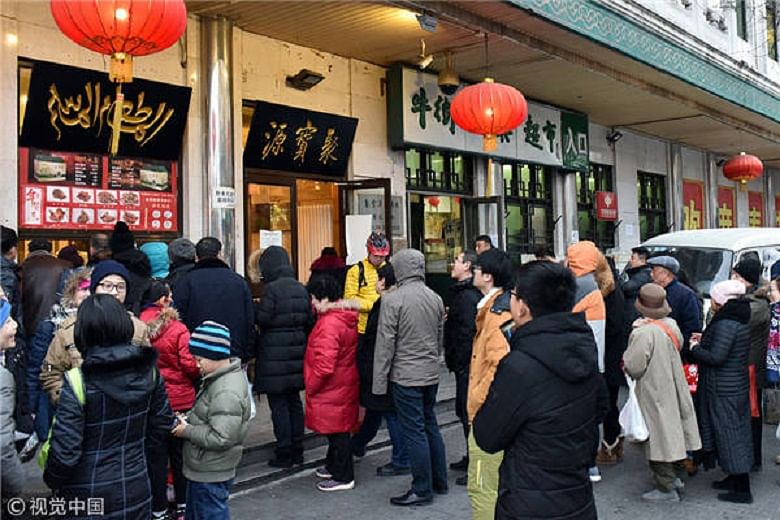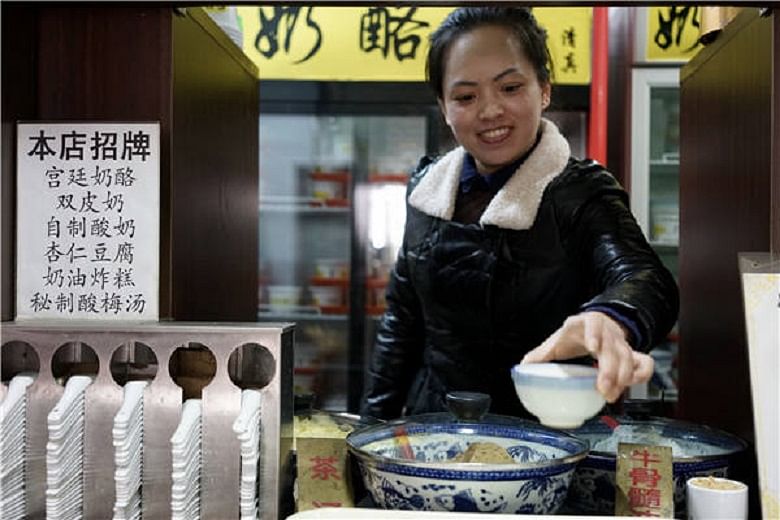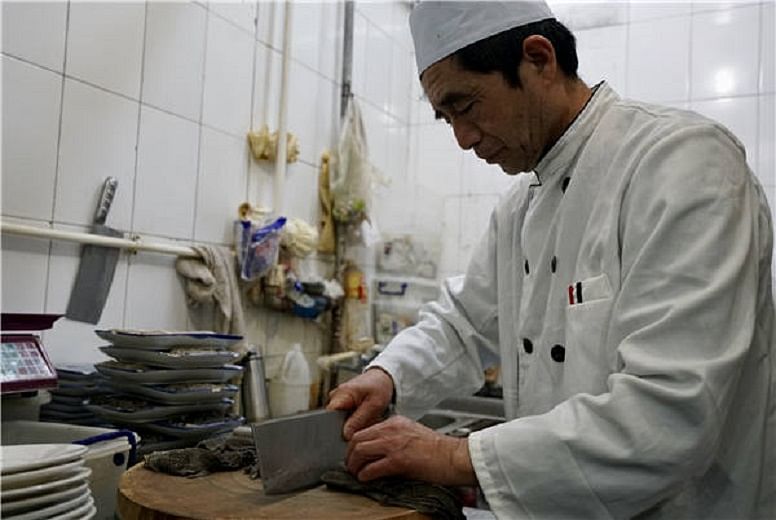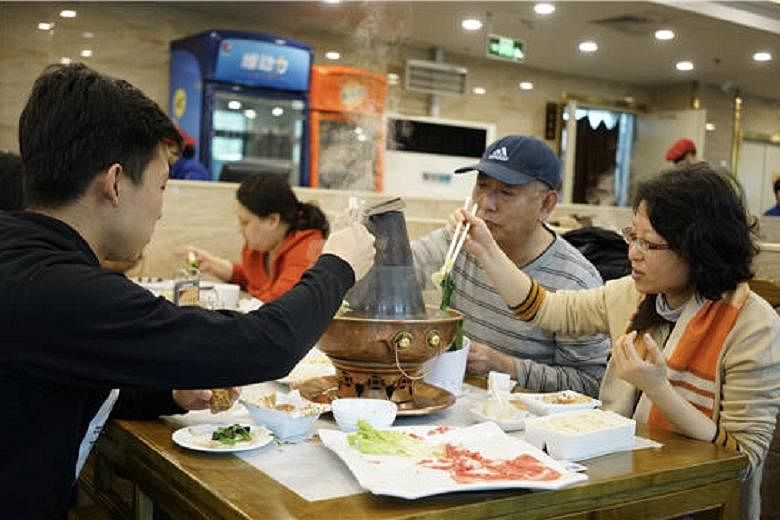(CHINA DAILY) - Recipes handed down through the generations ensure that halal cooking holds sway in a Beijing district.
It's Lantern Festival eve, and three long lines of people have formed along the west side of the Beijing street Niujie, and across the road there are two more.
Anywhere else in Beijing and these people could well be lining up to buy the seasonal delicacies of tangyuan or yuanxiao (rice dumplings), but in this case the lines are just part of the daily ritual. What the taste buds of these people in Niujie (literally Cow Street), Xicheng district, are hankering after is homemade halal food, readily available in the area, with its large population of those of the Hui ethnic group.
"All the food you see in Niujie, including snacks and its many delicacies, come with a taste of history, which runs down the generations and can be passed on," says Ma Enci, folklorist who is also the consultant of Niujie Halal Chamber of Commerce. "They also need to keep up with the times."
Hui people used to run many of the small family business in the neighbourhood, and there is a saying that they live with two knives and eight ropes - one knife to cut beef and mutton, one knife for glutinous rice cake, and the eight ropes are to tie the shoulder pole to carry the goods.
-
Three halal meat sellers and the origins of their family businesses
-
YUESHENGZHAI MA
Around 1763 Ma Qingrui began working in the Ministry of Rites for Emperor Qianlong of the Qing Dynasty (1644-1911), and he was then recommended to work in the imperial kitchen.
When he was rewarded with a whole sheep due to his diligent work, Ma would take it on to the street and sell various cuts. Later he quit his job and went into the mutton business. In 1775 he opened a store named Yueshengzhai that sold spiced mutton.
Given Ma's reputation for having worked in the imperial kitchen, his mutton soon became popular. The meat had to be cooked for seven to eight hours and then kept for a month.
The second generation Ma Yongxiang and Ma Yongfu then decided to improve the taste and consulted an imperial physician. They added clove, cinnamon, aniseed and other spices to make the mutton more flavorful and nutritious.
The mutton from Yueshengzhai then became the first choice for officials as a gift. Empress Dowager Cixi is said to have loved the meat, and issued permits for Ma's staff to deliver their mutton to her.
Ma Guoqi is the sixth generation, as is his brother Ma Guoai, who moved to Hohhot, Inner Mongolia autonomous region, in 1968, taking his mutton cooking skills with him.
When Ma Guoqi entered the family business in 1991, he raised their prices, reckoning that the premium quality of their beef and mutton warranted premium pricing.
"One kilogram of raw beef produces 500 grams of cooked beef and 1.2 kilogram of raw mutton produces 500 grams of cooked mutton," Ma says. "That's why it takes seven hours to cook the meat: we need to stew out all the water in the meat."
Ma recalls an opera actor passing by Yueshengzhai on a rickshaw just after meat had been taken out of the pot, and he ate a steamed bun soaked in just the fragrance of the meat.
Li Binsheng, a cartoonist, depicted that scene in a drawing for the Beijing Daily in 1950s, and when Ma and Li met decades later, the cartoonist produced an updated version of the drawing and gave it to Ma as a memento.
Now Ma's son Ma Yunpeng and daughter Ma Yunyan have taken over their family business and sell their meat at a booth of a company canteen in Beijing.
-
BAODU FENG
In 1888 Feng Lishan, a chef, moved from Shandong province to Beijing and started to sell quick-fried goat tripe in the street, for which he was given the name Baodu Feng (Quick-Fried Tripe Feng).
His son Feng Jinhe took over the business at the end of the reign of Emperor Guangxu (1875-1908) in the Qing Dynasty (1644-1911). According to Feng Fusheng, the fourth generation of the business, his grandfather Feng Jinhe, happened to know a prince who was in a street fight and they became friends.
The prince then introduced Feng Jinhe to the imperial kitchen and he became the goat tripe provider.
Feng Fusheng's father collected all the recipes of their business in written form, from the methodology to the ingredients of the special sauce, and passed this on to his sons. Ox tripe was added to their list when Feng Fusheng and his brothers registered their brand name as a restaurant in 1985, and now they have 13 different types of tripe available with nine sheep cuts and four ox cuts.
Feng Fusheng says different parts of the tripe have different flavors and need separate time to cook.
"They all just need seconds to quick fry, but each of them has its own time.
If you taste all the parts you should start with the chewy ones and then the crisp ones and finally the most tender ones. Even though some of them are chewy, they are easy to digest because tripe is the stomach of a sheep or an ox."
For some parts of the tripe, one plate needs to be cut from seven to eight sheep. In summer when sheep are slim it is hard to come by, which gave rise to the use of ox meat.
"There are also different ways of cutting different parts of the meat, meaning each piece of the tripe can be heated evenly," Feng says.
Because Feng Fusheng and his brothers have been dealing with tripe for decades, there is always something of a sheep odor about them.
"When I'm on a bus or go to the bank, people notice the smell and ask if I have just eaten mutton hotpot," Feng says.
-
CHEESE WEI
At the beginning of the reign of Emperor Guangxu (1875-1908) during the Qing Dynasty (1644-1911), Wei Hongchen learned how to make cheese from a chef in the imperial kitchen and started his business. He had this trick in which if he turned an open container of cheese upside down, the contents would not fall out.
The writer Liang Qiushi wrote in an artical Lao (Cheese) that the cheese from Cheese Wei tasted fresher and better than others, and each time he passed by he would eat two bowls of it.
"Anyone like me who had been out of Beijing for a long time missed the food there, and cheese was one of those foods," Liang said.
Wei Ning is now the fourth generation in the business. His father figured out the way to make rice wine for their cheese, and this became a family recipe.
"We used to buy rice wine to make our cheese, because my grandfather thought that if we made our own we would take other people's business," Wei says.
Wei's father used to sell cheese in two large blue insulation barrels on a street corner near Niujie each day at 3 pm. Both barrels could hold about 40 bowls of cheese, which were sold out soon after school finished.
Wei says that when he was a boy he could have cheese only during Spring Festival.
When Wei reopened the cheese store in Niujie in 2006, many middle-aged customers from the neighborhood would come to taste their childhood-memory flavor.
Wei has added more flavors to their traditional palace cheese, and has expanded their product range to milk custard, herbal jelly and almond jelly.
Almost every Hui family in Niujie has a nickname, their business activity being added to their family name, such as Rice Cake Ma or Tofu Jelly Bai. Some of the families' businesses have been passed on from generation to generation but others have disappeared.

The family name of Ma, born in Niujie, is Bobopu Ma (Pastry Store Ma), but the business ceased when his father died when he was 10.
Ma still cares about the people and food in Niujie, and when Niujie Halal Chamber of Commerce was founded in August 2015 he offered to help.
"Hui snacks have three characteristics: they are strong on color, strong on flavor, and heavy on oil, but we eat them with jasmine tea to get a balance," Ma says.
As a general greeting Chinese are in the habit of saying "Have you eaten?" whereas Niujie locals say "Have you made tea?" Ma says.
"A few things distinguish Hui people's food, namely its being incredibly varied, that it carries on from generation to generation, and that each family has its unique approach. It is also seasonal, and a lot of attention is paid to nutritional value."
Ma's family used to make a crisp egg cake called furonggao, which has a red, sweet topping and was very popular. Ma says people used to use food coloring and sugar to make the topping, but his family used saffron.
Feng Qiusheng's family business, which was founded in 1888, used to be in Niujie, but the family business moved to a nearby neighborhood in 2006.
Feng's family now runs two restaurants named on the basis of the family nickname, Baodufeng (Quick-Fried Tripe Feng).
Feng's father taught him how to make the sauce that goes with the family speciality, and Feng says it has taken him more than 40 years to master the art of cooking the tripe.
"Even though the cooking takes only seconds, four generations of hard work have gone into it," Feng, 66, says.
"It's a skill that is easy to learn but hard to perfect."
Each day Feng cooks about 50 kilograms of tripe, and from the day he started to cook in the kitchen in 1985, he says, he has handled at least 500 metric tons of tripe for customers.

He still goes to the kitchen every day to cook for his customers. "If you don't do it for a day you notice, if you don't do it for two days, your family notices, and if you don't do it for three days, your customers notice."
Cooking is the final step in preparing the dish, Feng says, but first you need to learn how to choose, wash and cut the tripe, and that requires one or two years' practice.
Feng is glad to see his old customers from 30 years ago now bring their sons and grandsons to eat his dishes.
"Each of these traditional snacks are irreplaceable, and I feel it's my responsibility to safeguard the flavor and pass it on."
Ma Guoqi, 76, also insists on continuing his family tradition of making spiced beef and mutton, even though he now only has a booth in a company canteen.
Ma is the sixth descendant of his family business, Yueshengzhai Ma, which was established in 1775, meaning it is a year older than the United States.
"From coal to gas tank, and now to electric cooker, we have updated the equipment we use to cook the meat, but the flavor is the same as it was generations ago," Ma says.
He now lets his son and daughter do the cooking, but has still not divulged the secret recipe of the spices yet.
"We don't have a written recipe, so it's all in my head. My father gave it to me just before he died, and he asked me to do the same.
"'We treat the meat the same way we treat our customers,' my father always told me."
Just as Ma's father impressed on him the importance of being honest in business, so it would last down the years, Ma impresses on his son the importance of being consistent with flavor.
"The idea is that today you have this taste, and tomorrow, next week, or next month, you will enjoy exactly the same taste."
Ma recalls that when his restaurant was small there was a customer who lived in the United States and often visited Beijing.
"The first place he would come to after arriving in Beijing was my restaurant, and he would order 150 grams of braised mutton and a bowl of noodles with braised mutton, and as he was heading back to the States he would come to my place and have exactly the same order before going to the airport."

Ma has lived in Niujie all his life, as has Wei Ning, also known as Cheese Wei. Unlike Ma, he still owns a cheese shop in Niujie, but he is confronted by the problem that his sons show no desire to continue the business.
Wei started to help his father to make cheese when he was 31, before which he worked in a factory. Learning from making rice wines to make the cheese, Wei gradually understood what his family business was about.
"There's a duty and responsibility to maintain the family tradition," Wei says.
Both sons are in their 30s, one a police officer and the other a computer programmer, and Wei believes they will eventually realize that they have a duty to take over the business.
"I'm the fourth generation of our family business, and this should continue. My sons don't realize how precious this brand is."

The founder of Cheese Wei, Wei Hongchen, learned from the chefs in the palace in the Qing Dynasty (1644-1911), about distributing imperial food to the masses. And Wei Ning's father researched the way to make their own rice wine.
Wei developed more flavors to suit young people's tastes, and also cut down the sugar in the cheese. "Besides less sugar, our cheese has kept the same flavor for decades," Wei says.
In the past, Wei says, people urged him to expand his stores, but he declined.
"All of our cheeses are handmade, and if we open more shops I won't have what it takes to ensure the quality."
"My father said we must not cut corners and we must keep our integrity."
Hong Yuchun, 61, manager of Hongji Snack in Niujie, says she has thought about opening new restaurants because there are always long lines outside the current one. But all her restaurant's food is homemade, she says, and before she can consider expanding needs to figure out how to keep consistency of flavor.
In contrast to other brands in Niujie that may go as far back as 200 years, Hongji Snack is relatively new, having been established in 1991, when it sold only three different snacks.
"We don't have a special recipe or a long history, and most Hui people can make snacks at home, so we just try to give each snack the best flavor we can with the best ingredients available," Hong says.

Her parents and all her eight siblings worked together to run the restaurant and learn from others how to make different Hui snacks, of which they now have 50 different kinds, she says.
"My father reckoned that before we sold food to others we must enjoy it ourselves."
Hong, born in Niujie, moved out when she married, but each time she returned for a visit "I would take this really deep breath when I was in the neighborhood."
She then decided to move back into the area.
There is always a long line outside Hongji Snack, and as it has relocated, so have those lines. Hong says that most customers are from outside Niujie, its reputation having grown thanks to word-of-mouth recommendations.
These days, too, young people are ordering takeaway from Hongji Snack on their smartphones. Hong's nephew, who helps in the restaurant, has advised Hong to open an online shop.

"Our generation is old-fashioned, so we may be a little slow on the uptake with these new sales methods," Hong says.
The three long lines on the other side of Niujie are outside Jubaoyuan, which gained a reputation over many years for its raw beef and mutton and cooked beef, but whose signature product is now mutton hotpot.
Ma Gang, the general manager, is a Niujie resident whose family is nicknamed Brick Ma, his father being a builder. He took over managing Jubaoyuan, which then had 12 staff, 25 years ago.
"We're known for our beef and mutton, so I go to the slaughterhouse each day and wait for the fresh meat and bring it back to the shop," Ma says.
When Niujie was upgraded in 1997, Ma took the sign that had hung outside Jubaoyuan's shop and reopened the business elsewhere. In 2003 he moved back to Niujie and, with much more space, decided to start offering mutton hotpot. That has been a resounding success.
The long lines outside seem to be a constant, and even at 10 pm people are still waiting for a table.
"The high quality of our beef and mutton is the key, and we need to keep that into the future," Ma says.

